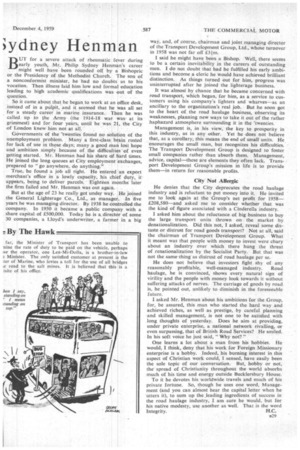;ydney Henman
Page 35

If you've noticed an error in this article please click here to report it so we can fix it.
BUT for a severe attack of rheumatic fever during early youth, Mr. Philip Sydney Henman's career
. might well have been rounded off by a Bishopric or the Presidency of the Methodist Church. The son of a nonconformist minister, he had no doubts as to his vocation. Then illness laid him low and formal education leading to high academic qualifications was out of the question. .
So it came about that he began to work at an office desk, instead of in a pulpit, and it seemed that he was all set for a steady career in marine insurance_ Then he was called up to the Army (the 1914-18 war was at its grimmest) and for four years, until he was 21, the City of London knew him not at all.
Governments of the 'twenties found no solution of the unemployment problem. Many a first-class brain rusted for lack of use in those days; many a good man lost hope and ambition simply because of the difficulties of even getting started. Mr. Henman had his share of hard times. He joined the long queues at City employment exchanges, prepared to "go anywhere, do anything." .
True, he found a job all right. He entered an export merchant's office in a lowly capacity, his chief duty,, it appears, being to deliver parcels. Eighteen months later the firm failed and Mr. Henman was out again. .
But at the age of 23 he really got under way. . He joined the General Lighterage Co., Ltd., as manager. In five years he was managing director. By 1938 he controlled the company. In 1950 it became a public company with a share capital of £500,000. Today he is a director of some 30 companies, a Lloyd's underwriter, a farmer in a big way, and, of course, chairman and joint managing director of the Transport Development Group, Ltd., whose turnover in 1958 was not far off L34m.
I said he might have been a Bishop. Well, there seems to be a certain inevitability in the careers of outstanding men. I do not doubt that had he fulfilled his early ambitions and become a cleric he would have achieved brilliant distinction. As things turned out for him, progress was uninterrupted after he joined the lighterage business.
It was almost by chance that he became concerned with road transport, which began, for him, as a service to customers using his company's lighters and wharves—as an ancillary to the organization's real job. But he soon got to the heart of the road haulage business, observing its weaknesses, planning new ways to take it out of the rather haphazard atmosphere surrounding it in the 'twenties.
Management is, in his view, the key to prosperity in this industry, as in any other. Yet he does not believe that, as a corollary, this means the end of small units. He encourages the small man, but recognizes his difficulties. The Transport Development Group is designed to foster small companies rather than absorb them. Management, advice, capital—these are elements they often lack. Transport Development Group's mission in life is to provide them—in return for reasonable profits.
City Not Allergic
He denies that the City deprecates the road haulage industry and is reluctant to put money into it. He invited me to look again at the Group's net profit for 1958— £208,580—and asked me to consider whether that was the kind of figure associated with a Cinderella industry.
I asked him about the reluctance of big business to buy the large transport units thrown on the market by denationalization. Did this not, I asked, reveal some distaste or distrust for road goods transport? Not at all, said the chairman of Transport Development Group. What it meant was that people with money to invest were chary about an industry over which there hung the threat of renationalization by the Socialist Party. .But that was not the same thing as distrust of road haulage per se.
He does not believe that investors fight shy of any reasonably profitable, well-managed industry. Road haulage, he is convinced, shows every natural sign of virility and the people with money look towards it without suffering attacks of nerves. The carriage of goods by road is, he pointed out, unlikely to diminish in the foreseeable future.
I asked Mr. Henman about his ambitions for the Group, for, be assured, this man who started the hard way and achieved riches, as well as prestige, by careful planning • and skilled management, is not one to he satisfied with long thoughts of yesterday. Does he aim at providing, under private enterprise, a national network rivalling, or even surpassing, that of British Road Services? He smiled. In his soft voice he just said, "Why not?"
One learns a lot about a man from his hobbies. He would, I think, deny that his work for Foreign Missionary enterprise is a hobby. Indeed, his burning interest in this aspect of Christian work could, I sensed, have easily been the sole topic of our conversation. But, hobby or not, the spread of Christianity throughout the world absorbs much of his time and energy outside Bucklersbury House.
To it he devotes his worldwide travels and much of his private fortune. So, though he uses one word, Management (and you can almost hear the capital letter when he utters it), to sum up the _leading ingredients of success in the road haulage industry, I am sure he would, but for his native modesty, use another as well. That is the word
Integrit y. H.C.
























































































































